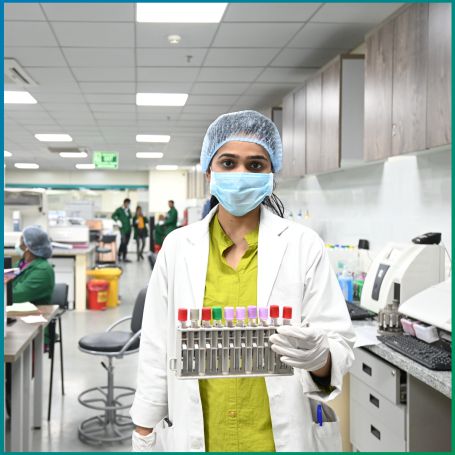
The TORCH 10 Panel Test is a blood test that screens for ten specific infections that can be passed from the mother to the baby during pregnancy.


These infections can lead to congenital disabilities, developmental issues, and, in severe cases, miscarriage or stillbirth. Early detection is key, as many of these infections can be asymptomatic but still harmful.
1] Toxoplasmosis: Caused by the parasite Toxoplasma gondii, this infection is typically transmitted through contaminated food, water, or cat feces. If contracted during pregnancy, it can lead to serious complications, including brain and eye damage in the fetus.
2] Other Infections: This group includes various infections, such as syphilis, varicella-zoster (chickenpox), and HIV, which are all known to cause serious complications during pregnancy.
3] Rubella (German Measles): Rubella is a viral infection that can cause congenital rubella syndrome, leading to heart defects, hearing impairments, and developmental delays in the fetus if contracted during pregnancy.
4] Cytomegalovirus (CMV): CMV is a common virus that can cause birth defects and developmental problems when transmitted from mother to baby during pregnancy.
5] Herpes Simplex Virus (HSV): HSV can be passed from the mother to the baby during childbirth, causing severe health issues in newborns, such as encephalitis (brain inflammation) and eye infections.
The infections screened by the TORCH 10 Test can have devastating consequences for both the mother and the fetus if left undiagnosed or untreated. Some infections, such as rubella or toxoplasmosis, can cause congenital disabilities, while others, like herpes simplex virus, can result in severe neonatal infections.
1] Early Detection and Prevention: Early identification of infections allows healthcare providers to take preventive measures and provide treatments that can minimize risks to both mother and baby.
2] Risk Management: If an infection is detected, doctors can monitor the pregnancy more closely, offering the best possible care for both the mother and the fetus.
3] Protecting the Fetus: The fetus is particularly vulnerable to infections, especially during the first trimester. The TORCH Panel Test helps to ensure that any infections are caught early to prevent serious complications.
4] Peace of Mind: For expectant mothers, the test offers reassurance that they are doing everything they can to ensure a healthy pregnancy.
5] Preventing Long-Term Complications: Some of the infections included in the TORCH 10 Panel Test can lead to long-term developmental issues in babies, such as hearing impairments or intellectual disabilities. Early detection and intervention can help reduce the severity of these complications.
Toxoplasma IgG Normal Range is <7.20 IU/mL
Toxoplasma IgM Normal Range is <6.00 AU/mL
Rubella IgG Normal Range is <7.00 IU/mL
Rubella IgM Normal Range is <20.00 AU/mL
Cytomegalovirus, IgG Normal Range is <12.00 U/mL
Cytomegalovirus, IgM Normal Range is <18.00 U/mL
Herpes simplex virus 1+2, IgG Normal Range is <0.90 Index
Herpes simplex virus 1+2, IgM Normal Range is <0.90 Index
1] Positive IgM: A positive IgM result suggests a recent or active infection.
2] Positive IgG: A positive IgG result typically indicates a past infection or immunity. For example, a woman who has had rubella in the past will have IgG antibodies against the virus, suggesting immunity.
3] Negative IgM and IgG: A negative result indicates no current or past infection, and there may be a need for vaccines or preventive measures.
At Diagnopein, we offer comprehensive, accurate, and timely diagnostic services, including the TORCH 10 Panel Test Pune. With our NABL-accredited labs, cutting-edge technology, and skilled technicians, you can be assured of reliable results every time. Get your results quickly, especially when time is crucial in detecting severe infections.
Competitive pricing without compromising on quality. Our team of experienced professionals ensures the test is conducted smoothly with minimal discomfort. We provide not just the TORCH 10 Panel test results but insights into your health condition, helping you and your doctor make informed decisions about treatment. For more information call us at +91 9204 108108.
Yes, the TORCH 10 test can be performed at any time during pregnancy, but it is commonly done in the early stages to detect any possible infections that could affect the pregnancy.
The TORCH 10 test is a simple blood test and poses minimal risk. You may experience slight discomfort or bruising at the blood draw site, but these symptoms typically resolve quickly.
No, fasting is generally not required before taking the TORCH 10 test. However, it is always recommended to check with your healthcare provider for specific instructions.
No special preparation is needed for the TORCH 10 test. However, it’s always a good idea to consult your healthcare provider for any specific instructions prior to the test.